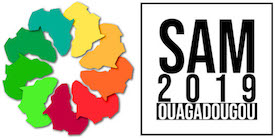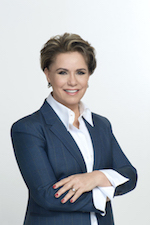This interview is part of a sponsored series on SAM (the French acronym for African Microfinance Week), a major conference dedicated to financial inclusion in Africa. The next SAM will take place October 21-25, 2019, in Ouagadougou, Burkina Faso!
MicroCapital: Your Highness has stated that microfinance “awakens the creative forces…enabling the poorest to regain their dignity and to bring about solutions for their own needs.” Is this why Your Highness is so involved in microfinance?
Your Highness has stated that microfinance “awakens the creative forces…enabling the poorest to regain their dignity and to bring about solutions for their own needs.” Is this why Your Highness is so involved in microfinance?
Grand Duchess Maria Teresa (pictured below): I would like to quote Professor Muhammad Yunus, who said that “Microcredit is, above all, a tool that unlocks human dreams and helps even the poorest and most unfortunate people on this planet achieve dignity, respect, and meaning in their lives.”
I have been involved in microfinance ever since I met Professor Yunus, because, through him, I discovered the importance of trusting the poorest of the poor, without conditions. By that I mean trusting in their honesty, in their creativity, in their capacity for hard work, and in their demand for dignity. It is important to push back against the idea that you are only trustworthy if you are backed up by finance, if you have collateral to put on the table. I would almost go so far as to say that the opposite is true. Professor Yunus demonstrated this by approaching the poorest of the poor. To women, in particular, he offered opportunity; and an astonishing percentage – over 95 percent – repaid that faith by paying their loans on schedule. Professor Yunus has said, “No poor person is poor out of choice, and not a single one is not intelligent.” Businesses can fail, but we must never cease to trust in the integrity of the people we aim to help. That is why I believe in microfinance, because it is proven that the poorest of the poor can transform their own lives and the lives of those around them by their own creativity and hard work, if they are given the chance. It is a question of trust.
 Photo: © Cour grand-ducale /
Photo: © Cour grand-ducale /
Emanuele Scorcelletti
pour Paperjam
Financial inclusion can be empowering, in particular for women and girls. How does this relate to the Grand Ducal vision for supporting developing countries?
It is extraordinary to see, especially in Africa, the extent to which women carry the economy of their countries. We all know how hard working they are – that women not only take care of the household and their children, but also that they are the ones who are out in the fields, working with children on their backs in the heat of the day. They are the ones carrying the heavy loads, bringing back the produce that they have cultivated. The African economy owes a tremendous debt to all the women of Africa.
On the other hand, they have few rights. In many countries, women do not have the right to travel, to own property, to open a bank account or even the right to education and a safe journey home.
The power of microfinance is that it goes hand in hand with technical assistance and education. Education is the most effective way of empowering women so that they are aware of their rights and their value in society. It is not just a duty, but a necessity to unlock the potential of a half of the population. We so easily overlook the luxury of having options in our lives – the choice to study what we want, live where we want, marry whom we want. For many women around the world, choice is just a dream.
Luxembourg has close bilateral partnerships with a group of countries in West Africa, Asia and Central America that form the core of our cooperation work. This is executed by various agencies and NGOs, such as ADA, with the support of the Directorate for Development Cooperation and Humanitarian Affairs.
Climate change has added a terrible new challenge to populations in all these regions. This is why we are very active in conducting field research into microfinance programmes that help to mitigate the effects of climate change, such as microinsurance for farming smallholders. On a wider scale, Luxembourg is very active in supporting multilateral projects.
What has motivated Your Highness to support inclusive finance for so many years, in light of the many competing priorities in international development?
As a UNESCO Goodwill Ambassador and as UNICEF’s Eminent Advocate for Children, I became interested in the microfinance and educational sectors, with a particular focus on the education of girls and young women. From my experience of over 20 years, I remain firmly convinced that microfinance is one of the key levers for poverty eradication across the world, for guaranteeing high-quality education to less privileged children in developing countries and for providing job prospects to young people. As you may know, 75 percent of microfinance clients are women. Over the years, financial inclusion has played an invaluable role in women’s emancipation, allowing women to create their own enterprises, earn money, gain independence and enjoy dignity. Through microfinance, women (and men!) can increase their contribution to their households, their villages, their countries…
I am also active in working to stop violence against women in fragile environments. Microfinance, by enhancing women’s autonomy, is a key tool in the recognition of survivors and the reconstruction of their lives. Indirectly, it helps in the fight against the perpetrators who use violence to subjugate populations.
Twelve years ago, Your Highness bestowed High Patronage upon ADA. What would Your Highness like to say about the NGO reaching its 25th anniversary?
ADA plays a key role in microfinance. In 25 years, the NGO has developed so many innovations, including many new strategies for professionalizing MFIs. I am proud that this highly esteemed NGO has made its home in Luxembourg, a country whose expertise in finance (including microfinance) is well established. Today, ADA is involved in projects all over in the world, from Africa to South America and Southeast Asia. Very few NGOs last 25 years; this longevity symbolises how effectively ADA supports inclusive finance. And by doing so, it is one of the levers for reducing poverty long-term.
What has impressed Your Highness about the SAM conference?
The SAM conference has the unique power to gather more than 700 experts in microfinance from the whole of Africa – and across the globe. For one week – from October 21 to October 25 – SAM becomes the world capital of microfinance. Whether they are directors of MFIs, banks, NGOs, public institutions, fund management firms or even government ministries, attendees can meet and exchange views about both the present and future of inclusive finance. SAM is not a snapshot of a moment in microfinance; it is a full week to share best practices, multiply impact and transform the whole sector. The agenda is so rich, with a training on social performance, two courses on microinsurance and three workshops on digital finance – as well as sessions on topics such as gender and blended finance – I am fully confident that participants will return from SAM with innovative ideas, new perspectives and a myriad of useful contacts.
By strengthening leadership within the sector, SAM has a major influence on inclusive finance. I strongly believe that financial inclusion can continue to play a key role in reducing poverty as well as supporting women’s freedom. Unfortunately, my busy schedule will not allow me to travel to Ouagadougou, but I would like to tell every potential participant: don’t miss this opportunity to take part in the evolution of inclusive finance.
I cannot conclude without mentioning Burkina Faso. This country is facing so many challenges, such as poverty, the repression of women and security issues. I strongly believe this is a place where inclusive finance can have a deep and meaningful impact.
ADA, an NGO based in Luxembourg, co-organizes SAM every two years with the support of Luxembourg’s Ministry for Development Cooperation and Humanitarian Affairs. The SAM steering committee members are: ADA, Luxembourg’s Ministry of Foreign and European Affairs, the Microfinance African Institutions Network, the African Rural and Agricultural Credit Association, and the Fédération des Association Professionnelle des Systèmes Financiers Décentralisés de l’Union Economique et Monétaire Ouest Africaine. We invite you to learn more about SAM at http://www.sam.africa.
MicroCapital has been contracted to promote and perform on-site documentation of each SAM since 2015.
Sources and Additional Resources
Vignettes demonstrating the value of SAM and other MicroCapital coverage of the events
http://www.microcapital.org/category/semaine-africaine-de-la-microfinance-sam/
Vignettes demonstrating the value of SAM en francais
https://www.ada-microfinance.org/fr/evenements/semaine-africaine-microfinance/objectif-sam-2019/paroles-de-nos-participants
Similar Posts:
- MICROFINANCE EVENT: SAM (Semaine Africaine de la Microfinance); October 16-20, 2023; Lomé, Togo
- MICROCAPITAL BRIEF: Mi-Bospo of Bosnia and Herzegovina Borrowing $2.2m from Grameen Credit Agricole Foundation for Microfinance Lending
- SPECIAL REPORT: Increasing Financial Access for Women with Better Data, Mentoring, Staff Training, “Gender-smart” Audits
- SPECIAL REPORT: Banco FIE of Bolivia Takes $100k “Financial Inclusion that Works for Women” European Microfinance Award 2022
- SPECIAL REPORT: European Microfinance Week Is Almost Here!
